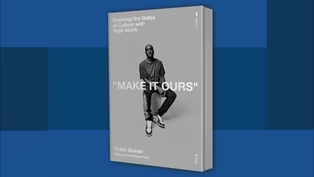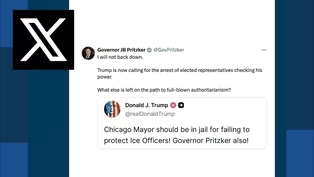Chicago Tonight: Black Voices
Advocates Push for More Equitable Public Transit Reform
Clip: 10/8/2025 | 8m 43sVideo has Closed Captions
Chicago-area public transit agencies are facing a fiscal cliff.
As state lawmakers head to Springfield to discuss a possible transit funding plan, some advocates say Black communities on the South and West sides are being ignored.
Problems playing video? | Closed Captioning Feedback
Problems playing video? | Closed Captioning Feedback
Chicago Tonight: Black Voices is a local public television program presented by WTTW
Chicago Tonight: Black Voices
Advocates Push for More Equitable Public Transit Reform
Clip: 10/8/2025 | 8m 43sVideo has Closed Captions
As state lawmakers head to Springfield to discuss a possible transit funding plan, some advocates say Black communities on the South and West sides are being ignored.
Problems playing video? | Closed Captioning Feedback
How to Watch Chicago Tonight: Black Voices
Chicago Tonight: Black Voices is available to stream on pbs.org and the free PBS App, available on iPhone, Apple TV, Android TV, Android smartphones, Amazon Fire TV, Amazon Fire Tablet, Roku, Samsung Smart TV, and Vizio.
Providing Support for PBS.org
Learn Moreabout PBS online sponsorship>> Chicago area public transit agencies are facing a fiscal cliff.
The budget gap for CTA, Metra and Pace is at 200 million dollars.
According to the regional Transit agency.
While that's down from 771 Million Dollar estimate earlier this year, transit officials are warning without more funding service cuts and layoffs could still hit next year as state lawmakers head to Springfield next week to discuss a possible funding plan.
Some advocates say black communities on the city's south and west sides are being ignored in decisions about transit reform.
Joining us now with more are Denise Barreto, former chief equity and engagement officer for the Chicago Transit Authority.
Adams, late director of state fiscal policy at the Illinois Black Advocacy Initiative and on Zoom State, Representative Kam Buckner, who represents parts of the loop in the city's south side.
We also invited the Chicago Transit Authority, but they declined.
We welcome the 3 of you.
Thanks for joining us.
Denise, let's start with you, please.
So you wrote in an op-ed that was published in the Chicago Tribune a few weeks ago that black voices are often pushed out of the discussion about transit.
How so?
Well, when I think about the folks that you see at the day today at our board meetings at the RTA board meetings.
>> The folks doing witness slips, the organizing around discussion.
They are very few black faces that her in that and I acknowledge the ones that I saw.
But there's quite a few folks that are just not there and black people power transit, not just at CTA black people.
Trent Power Transit in the Northeast.
And I believe that our voices need to be heard.
So you say they aren't there.
They're not showing up.
That is that is optional, of course, to show up so well out or not incur.
Well, it's I think it's both because when the holy opportunities to have to our daytime meetings at 10:00AM on a Wednesday once a month, I think our team meetings are also during the day.
When you have one budget hearing when you have town halls that are not there's not a lot of outreach in neighborhoods with community organizations.
There's lots of ways that I could point to.
It's just equitable system when it comes to giving feedback and whose voices are listened to.
Representative is this something that you've experienced in Springfield?
Is this something that you feel like?
It's also?
>> Not happening.
News voice is not being hurt or being pushed out in the conversations is happening.
>> be clear about this that the way that our systems have always worked.
We've got to always try a little harder to make sure that black forces are centered now as a as a black man who lives on the south Chicago, who is one of the chief negotiators of this transit conversation have gone out to have black groups around the city places like Woodlawn and that which is focus on the West side also in North Lawndale to figure out what to get forces.
We we know the data shows the stark reality.
Black Chicagoans suffer from worst transit situation experienced gardens around the around the region were not black.
And so one of the charges for me in this conversation is to make home expenses talking to folks with those some train operators.
Those the folks who work at stations with those are people who are using systems every single day to have conversations.
>> Adam, what this fair and equitable public transit in the region look like?
What should it look like?
>> Fair and equitable.
Transit is a great dream that I wish we could realize.
and especially in the northeast region fair and equitable means that all communities have access to major institutions in their neighborhood.
I know being able to get to the grocery store, being able to get to the hospital are being able to get to your place of employment quickly and efficiently and safely.
All are the dream of a good regional transit system.
>> Representative Buckner, does this smaller fiscal cliff that we talked about, you know, for down to 200 million from 771 Million.
Does that take a little bit of the pressure off of lawmakers come up with a solution, a little bit of pressure to maybe wait until the spring session versus veto session.
>> Also to the pressure, while it may seem like it's less, it really is still very necessary to RT update that took clip from 770 million 200 It's a huge swing.
you know, it really also underscores why this work is important because what I get number and with the system worked right now, it's OK start transparent for us to figure that out.
And so I've been there with my colleagues and my constituents that we have only 2 options here.
One option is to continue to kick the can down the road and pretend as if nothing is happening or second option is to actually it.
we and do it intentionally so we can move the system alone.
So black folks in the folks around the city and this region take transit who operate trains and we use it as a backbone of our economy can do so in the right way.
>> According to responses from a regional Transit Authority passenger survey, black people make up 40% of paces writer base 27% of see Tas writer based in 13% of Metro's writer base Denise folks may look at these numbers and say, okay, well, black people to start using the CTA.
You know, what difference does it make if their voices are included any more than they already are?
What do you say to that since?
Well, first I start with black workers, Trent, like 73% of the people that work at the CTA are black people.
The second thing is that's based on RTA is on customer service surveys that they put out.
>> I always think that those are always under counted for folks in our community.
And then I think the final thing that has to do with access in the black community, we have a car culture.
If you live somewhere where it takes you 2 hours to get places, you aspire to have a car and you'd rather have a car, then have to wait the times that they have to wait for the bus or not have trained access like folks all killed gardens.
And so I think it's unfair to look at our tas numbers around black people and their ridership because it's not accurate.
And then the final thing I will say is when the cuts that were made back in 2008, you look at the access their people, but people have more access bus wise before those last set of cuts that happen.
And so it's sort of a bill that they come sort of thing.
We've we just reintroduce some different services.
And when you have the service and its frequent people use it.
To that point, Adam, would black ridership be higher if there were changes improvements to service?
>> Absolutely.
100%.
One of the main pieces that we heard last week was that the federal funding for the Red Line extension was cut to the far South side.
And this touches the nieces point about access to service.
We have significant gaps on the south side for access to transit and regular bus schedules.
And if folks could access transit, they would take it and they would love it, especially if they haven't been used to having that kind of a manatee in that community and it would connect them to the wider region as well.
Yeah, we just had a conversation on this program last night, of course, about red line cuts.
>> Representative Buck know what kind of conversations are you having with suburban lawmakers who say that the proposed reforms to local transit weeds too much control in the hands of the city.
>> I'm reminding them that this is a regional system is a regional medical system and Chicago goes so goes the rest of the region.
And so when you talk about the collar counties to patients Lake and will the what has to happen is that we have to figure out how we work together hand in the building consensus system.
It doesn't just work for the folks in my district in and was but also works for the folks in places like ocean.
on the places that measure goes to the south Others hope have a lead service by pace.
We have to stop the silo thinking.
I'm having a conversation with many of my colleagues and many of them do understand it.
It's really just reprogramming our south and refi, part of the past and create a system that works for the future.
>> Denise, 20 seconds left.
How do you get more people involved making their voices heard?
Well, first of all, I think you for having the segment tonight because I think getting the word out to folks, I think talking to faith-based organizations and community organizations.
That's what I'll be doing.
I'm a private citizen advocate now and that's what I'll be Okay.
Once leave it, we listen listen out for more of your
Robin Givhan Chronicles Fashion Icon Virgil Abloh's Life in New Book
Video has Closed Captions
Clip: 10/8/2025 | 8m 50s | Illinois native Virgil Abloh shifted the meaning of luxury and who gets to participate in it. (8m 50s)
Texas National Guard Troops Are on the Ground in Illinois
Video has Closed Captions
Clip: 10/8/2025 | 3m 8s | No riots have been reported in Chicago, even as protesters have been tear-gassed by federal agents. (3m 8s)
Providing Support for PBS.org
Learn Moreabout PBS online sponsorship
- News and Public Affairs

Top journalists deliver compelling original analysis of the hour's headlines.

- News and Public Affairs

FRONTLINE is investigative journalism that questions, explains and changes our world.












Support for PBS provided by:
Chicago Tonight: Black Voices is a local public television program presented by WTTW

